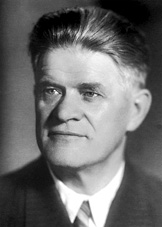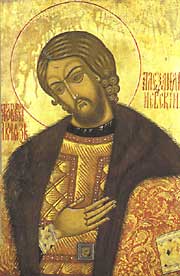Pavel Cherenkov
| Pavel Cherenkov | |
|---|---|
 |
|
| Born | 15 July 1904 Voronezh Oblast, Russian Empire |
| Died | 6 January 1990 (aged 85) Moscow, Russia |
| Nationality | Russian |
| Fields | Nuclear physics |
| Institutions | Lebedev Physical Institute |
| Alma mater | Voronezh State University |
| Doctoral advisor | Sergey Vavilov |
| Known for | Cherenkov radiation |
| Notable awards | Nobel Prize in Physics (1958) |
Pavel Alekseyevich Cherenkov (Russian: Павел Алексеевич Черенков, 1904–1990) was a Soviet physicist who won the Nobel Prize in physics in 1958 for the discovery of the Cherenkov radiation he made in 1934.
Contents |
Biography
Cherenkov was born in 1904 to Aleksey and Maria Cherenkov in the small village of Novaya Chigla in present day Voronezh Oblast, Russia.
He graduated from the Department of Physics and Mathematics of Voronezh State University in 1928, in 1930 he took a post as a senior researcher in the Lebedev Institute of Physics. That same year he married Maria Putintseva, daughter of A.M. Putintsev, a Professor of Russian Literature. They had two children together, a son, Aleksey, and a daughter, Elena.
Cherenkov was promoted to the section leader, and in 1940 he was awarded the degree of Doctor of Physico-Mathematical Sciences. In 1953 he was confirmed as Professor of Experimental Physics. Starting in 1959, he headed the institute's photo-meson processes laboratory. He remained a professor for fourteen years. In 1970 he became an Academician of the USSR Academy of Sciences.
Cherenkov died in Moscow on January 6, 1990, and was interred in Novodevichy Cemetery.
Discoveries in physics
In 1934, while working under S.I. Vavilov, Cherenkov observed the emission of blue light from a bottle of water subjected to radioactive bombardment. This phenomenon, associated with charged atomic particles moving at velocities greater than the speed of light in the local medium, proved to be of great importance in subsequent experimental work in nuclear physics, and for the study of cosmic rays. Eponymously, it was dubbed the Cherenkov effect, as was the Cherenkov detector, which has become a standard piece of equipment in atomic research for observing the existence and velocity of high-speed particles. The device was installed in Sputnik 3.
Pavel Cherenkov also shared in the development and construction of electron accelerators and in the investigations of photo-nuclear and photo-meson reactions.
Awards and honours
Cherenkov was awarded two Stalin Prizes, the first in 1946, sharing the honor with Vavilov, Frank and Tamm, and another one in 1952. He was also awarded the USSR State Prize in 1977. In 1958 he was awarded the Nobel Prize in Physics for the discovery of the Cherenkov effect.[1] He was also awarded the Soviet Union's Hero of Socialist Labor title in 1984. Cherenkov was a member of Communist Party of the Soviet Union
References
External links
- Cherenkov's photo – from the Russian Academy of Sciences
|
||||||||||||||||||||
|
|||||||||

.jpg)